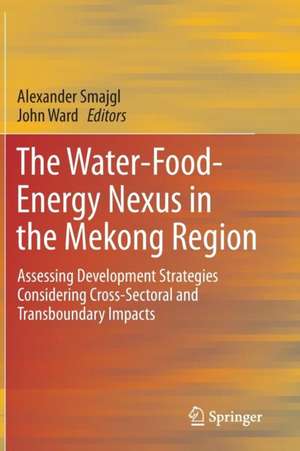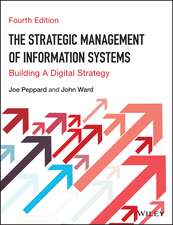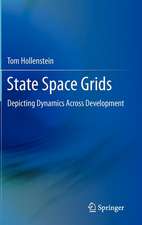The Water-Food-Energy Nexus in the Mekong Region: Assessing Development Strategies Considering Cross-Sectoral and Transboundary Impacts
Autor Alexander Smajgl, John Warden Limba Engleză Paperback – 18 mai 2013
Preț: 384.86 lei
Nou
Puncte Express: 577
Preț estimativ în valută:
73.65€ • 76.61$ • 60.80£
73.65€ • 76.61$ • 60.80£
Carte tipărită la comandă
Livrare economică 14-28 aprilie
Preluare comenzi: 021 569.72.76
Specificații
ISBN-13: 9781461461197
ISBN-10: 1461461197
Pagini: 125
Ilustrații: XI, 231 p. 42 illus.
Dimensiuni: 155 x 235 x 20 mm
Greutate: 0.34 kg
Ediția:2013
Editura: Springer
Colecția Springer
Locul publicării:New York, NY, United States
ISBN-10: 1461461197
Pagini: 125
Ilustrații: XI, 231 p. 42 illus.
Dimensiuni: 155 x 235 x 20 mm
Greutate: 0.34 kg
Ediția:2013
Editura: Springer
Colecția Springer
Locul publicării:New York, NY, United States
Public țintă
ResearchCuprins
Mekong Region Activity.- Water Sector Analysis.- Food Security In the Greater Mekong Subregion.- The Energy Sector.- Livelihoods and Migration.- Land-Use Change.- Mining.- Cross-Sectorial Assessment.
Notă biografică
Alexander Smajgl is researcher at CSIRO Ecosystem Sciences, Queensland, Australia.
Textul de pe ultima copertă
This book provides a cross-sectoral, multi-scale assessment of development-directed investments in the wider Mekong Region. The wider Mekong Region includes Lao PDR, Cambodia, Thailand, Vietnam, Myanmar and the Chinese Province of Yunnan. This book gives important insight into how future sustainability will depend on the development of effective governance mechanisms at the level of the Mekong region. Evidence highlights a limited set of critical dynamics that generate a high level of connectivity between these countries, including human migration, natural resource flows and increasing levels of private and State financial investments. Besides regional connectivity, this assessment considers cross-sectoral implications, in particular those between the water, food and energy sectors. The majority of nationally planned and implemented development decisions in the wider Mekong Region aim for either improved water access, increased energy supply or improved food security. Investments in any of these three sectors are critical as they are closely linked, harbouring potential trade-offs and unintended side effects.
Successfully managing the water, food and energy nexus demands an understanding of direct and indirect connections. A few identified connections are direct trade-offs, for example the use of water for either food or energy crops. Other connections are indirect and their estimated magnitude suggests their critical importance. Identified nexus criticalities include fish stock management, land tenure, risk management of monoculture plantations and migration dynamics. The sustainability of the wider Mekong region will partly depend on how successfully these processes can be managed. Managing nexus criticalities, in contrast to specific sectoral investments, represents an alternate and potentiallyeffective locus of policy intervention and initiative. Using case studies that include mainstream dams in the lower Mekong basin, water diversions between Lao PDR and Thailand, investments in response to rising sea level, this volume provides critical information for researchers and policymakers.
The research was generously funded and supported through the AusAID CSIRO Alliance.
Successfully managing the water, food and energy nexus demands an understanding of direct and indirect connections. A few identified connections are direct trade-offs, for example the use of water for either food or energy crops. Other connections are indirect and their estimated magnitude suggests their critical importance. Identified nexus criticalities include fish stock management, land tenure, risk management of monoculture plantations and migration dynamics. The sustainability of the wider Mekong region will partly depend on how successfully these processes can be managed. Managing nexus criticalities, in contrast to specific sectoral investments, represents an alternate and potentiallyeffective locus of policy intervention and initiative. Using case studies that include mainstream dams in the lower Mekong basin, water diversions between Lao PDR and Thailand, investments in response to rising sea level, this volume provides critical information for researchers and policymakers.
The research was generously funded and supported through the AusAID CSIRO Alliance.
Caracteristici
Provides a cross-sectional analysis of development-directed investments in the wider Mekong region The wider Mekong region includes Laos, Cambodia, Thailand, Vietnam, Myanmar, and the Chinese province of Yunnan Includes supplementary material: sn.pub/extras












